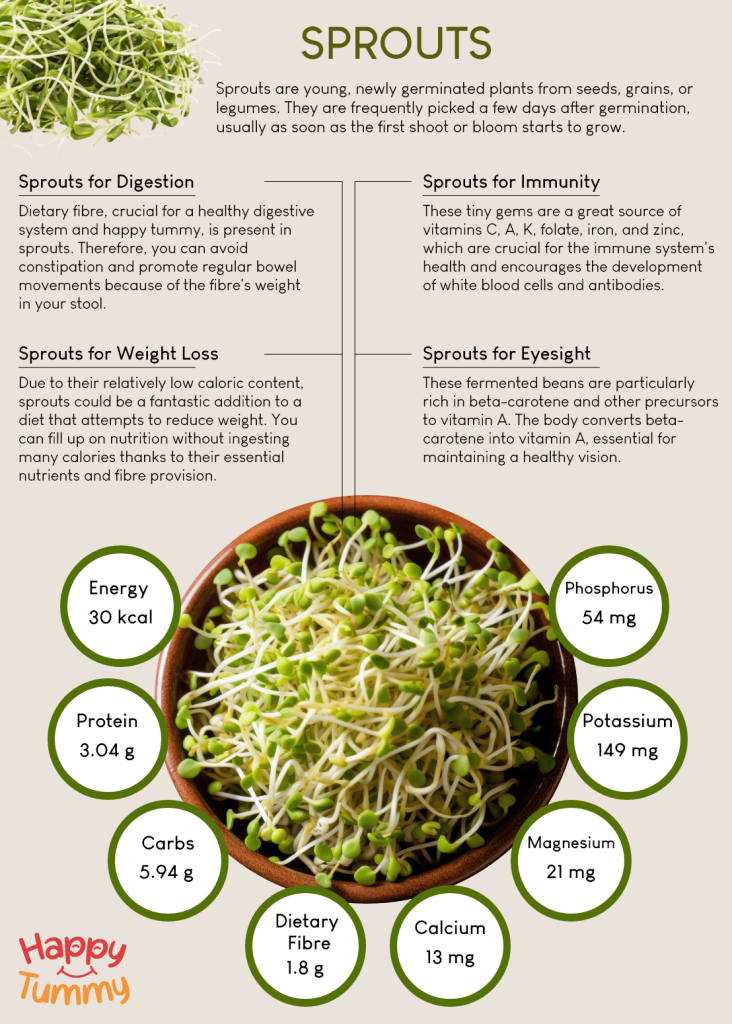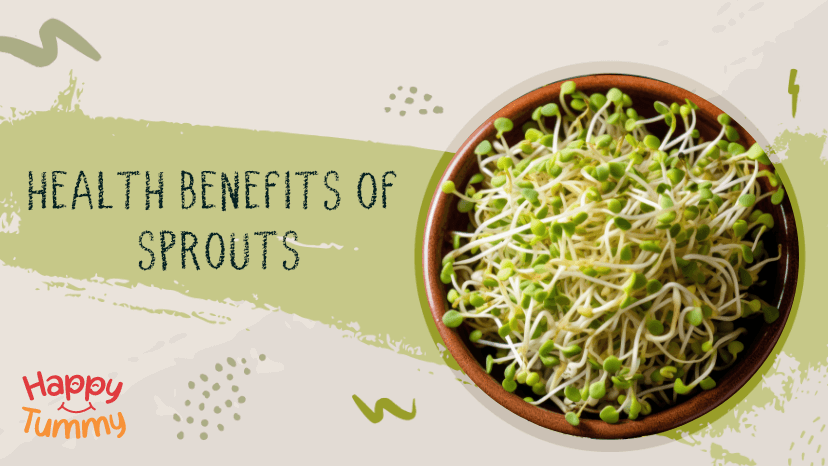Table of Contents
If there was one food that every Indian youngster was forced to eat as a child, it was dal. Every Indian mother will tell you that “dal is good for your health.” – Sprouts!
But is it truly the case? Lentils, or dals as we call them, are superheroes packed with nutrients that are beyond imagination. They can help us grow and aid and provide many health benefits.
Although the main question is, do we have to eat these dals in the same old manner to get the nutrition our bodies need? The answer is No.
If you haven’t tasted sprouts, it is time for you to include them in your diet. Sprouts are one of nature’s nutritious powerhouses that are small but formidable and have a vast nutritional impact.
These tiny, flavorful greens are more than simply a garnish for salads or sandwiches; they are a nutritious treasure trove waiting to be discovered.
We will delve into the fantastic journey of these small wonders and explore their transformational effect on your health in this investigation of sprouts and their plethora of advantages.
So, let’s evolve into a world of well-being, one crunchy mouthful at a time.
What are Sprouts?
Sprouts are young, newly germinated plants from seeds, grains, or legumes. They are frequently picked a few days after germination, usually as soon as the first shoot or bloom starts to grow.
Alfalfa, broccoli, mung beans, radish, and lentil sprouts are just a few examples of the prevalent forms of sprouts.
Soaking seeds, grains, or legumes in water for a brief time—typically 2–7 days, depending on the type of sprout and the desired size—allows them to germinate and grow in sprouting.
Sprouts are noted for their nutty or somewhat spicy mild flavour and crisp, fresh texture. They can be incorporated into various foods to provide flavour and nutrients. They are widely used as garnishes and in salads, sandwiches, and wraps.
Nutritional Profile of Sprouts
Check out the table below to see what benefits 100 grams of sprouts can provide for your health. A few things that can work miracles and are frequently required by our bodies will astound you. [1].
| Name | Amount |
| Energy | 30 kcal |
| Protein | 3.04 grams |
| Carbohydrates | 5.94 grams |
| Dietary Fibre | 1.8 grams |
| Calcium | 13 mg |
| Magnesium | 21 mg |
| Potassium | 149 mg |
| Phosphorus | 54 mg |
Health Benefits of Sprouts

Since they are a great source of vitamins, minerals, enzymes, and antioxidants, sprouts are valued for their health advantages. Their high dietary fibre, folate, vitamin K, and vitamin C levels are well known.
They have gained appeal as a part of a balanced diet because of their superior nutritional value and potential health benefits. They are sometimes referred to as superfoods because of their capacity to offer a concentrated amount of nutrients in a compact form.
1. Sprouts for Digestion
Imagine a bowl of crunchy and nutritious food that can help you eliminate digestion issues and always have a happy tummy. So, promising to be true. Isn’t?
Well, that is exactly what sprouts do to your body [2]. Dietary fibre, crucial for a healthy digestive system and happy tummy, is present in sprouts.
Therefore, you can avoid constipation and promote regular bowel movements because of the fibre’s weight in your stool. Additionally, it encourages the development of advantageous gut flora, which can enhance overall gut health.
Moreover, some enzymes are triggered and multiply in sprouts throughout the sprouting process. Your body can digest and absorb complex carbohydrates, proteins, and lipids more readily when these enzymes break down into simpler forms, including amylase, protease, and lipase.
If you want to know the fibre ratio in sprouts, check it out on My Meal Plan. Knowing the fibre percentage will be a bonus when you include it in your meals.
Additionally, some sprouts’ alkaline pH can help to balance the body’s acidity levels. Acid reflux and other digestive problems can result from a highly acidic environment in the digestive tract. You may maintain a healthy pH level by eating sprouts.
Sprouts’ fibre and minerals can act as a food supply for the good bacteria in the gut. The gut microbiota must be diverse and well-balanced for healthy digestion and well-being. If you want to learn how your digestive system works, take the Digestive Quotient Test today.
Therefore, including these tiny superheroes in your diet is essential and a good practice.
2. Aids in Weight Loss
Weight loss is one topic that is evergreen and is everyone’s favourite. For anyone looking for healthy ways to lose weight, sprouts are the most excellent substitute [3].
Due to their relatively low caloric content, sprouts could be a fantastic addition to a diet that attempts to reduce weight. You can fill up on nutrition without ingesting many calories thanks to their essential nutrients and fibre provision.
Dietary fibre, which sprouts are an excellent source, will help you feel satisfied and full after eating. Sprouts are low in calories yet high in essential vitamins, minerals, and antioxidants.
This nutrient density guarantees you receive the elements you require while limiting your calorie intake, which is essential for general health and well-being when reducing weight.
Sprouts provide significant protein, particularly legume sprouts like mung bean and lentil sprouts. Protein is renowned for its ability to satiate hunger and desires. It is essential for preserving muscle mass when you lose weight.
Sprouts typically have less fat, which is advantageous for weight loss. By ingesting fewer calories, foods with less fat can aid in weight loss.
Sprouts can be added to salads, sandwiches, wraps, and stir-fries, among other foods. Your meals’ crisp texture and mild flavour may make them more enjoyable and complete.
3. Sprouts for Immunity
We all are looking for delicious, nutritious food products that can also help us fight infections. With sprouts, your search will be over. All of these are present in a dish of sprouts [4].
These tiny gems are a great source of vitamins C, A, K, folate, iron, and zinc, which are crucial for the immune system’s health.
The immune-stimulating properties of vitamin C are well recognized since it encourages the development of white blood cells and antibodies.
They are also a fantastic source of flavonoids and polyphenols, two antioxidants that help shield cells from oxidative damage by free radicals. This defence may improve the immune system’s general performance.
Additionally, your immune system may become weakened by ongoing inflammation. Sprouts include compounds with anti-inflammatory properties, including quercetin and kaempferol, which can lessen inflammation and enhance immune system performance.
4. Sprouts for Eyesight
Have you heard about the more the merrier? It implies perfectly for sprouts. They are best for every possible thing, including eyes [5].
When made from mung beans or lentils, these fermented beans are particularly rich in beta-carotene and other precursors to vitamin A.
The body converts beta-carotene into vitamin A, essential for maintaining a healthy vision. The retina’s performance and the capacity to see in low light critically depend on it.
Antioxidants like these can be discovered in sprouts like broccoli and alfalfa. They are known to gather in the eye’s macula, where they aid in shielding the tissue from harm caused by high-energy light waves like UV radiation.
Moreover, zinc, a necessary mineral for eye health, is present in certain sprouts. The retina contains significant amounts of zinc, crucial for preserving vision clarity.
Hence, sprouts are undoubtedly a blessing for people with eyesight issues.
Conclusion
In conclusion, sprouts are a natural nutritional and health powerhouse. They provide many advantages in a small, crunchy package, from their capacity to improve digestion and promote immunological function to encouraging healthy eyes and assisting in weight management.
Including them in your diet will help you feel better overall by enhancing your general health and well-being, whether you consume them as a side dish, in salads, sandwiches, or other foods.
So, why then wait? Start sprouting immediately and enjoy the delectable advantages these little miracles have to give. Your body will appreciate it!
FAQs
Sprouts are a nutritious and power-packed superfood that offers many healthy advantages. Since they are soaked and then sprouted, they produce enzymes that can support healthy digestion and offer weight loss.
Yes, you can eat sprouts daily, but try adding variations. You can make sprouts of various dals, legumes, beans, etc. You can try to rotate to offer your body nutrients from each type.
Sprouts can be eaten in quantities of one to two cups daily. They have several health advantages and are an excellent source of vitamins, minerals, and antioxidants.
Chickpea sprout is believed to contain the highest protein. You can use them as raw or in hummus for extra texture and flavour.















